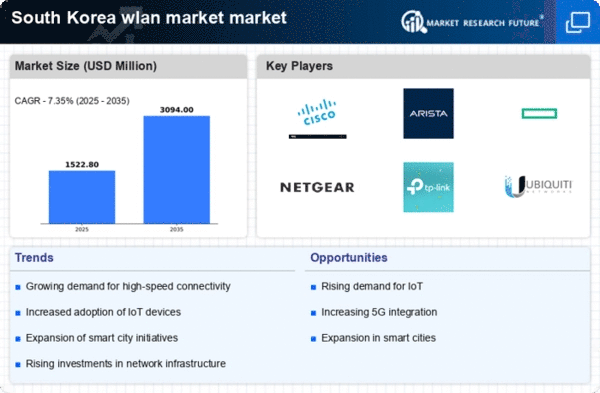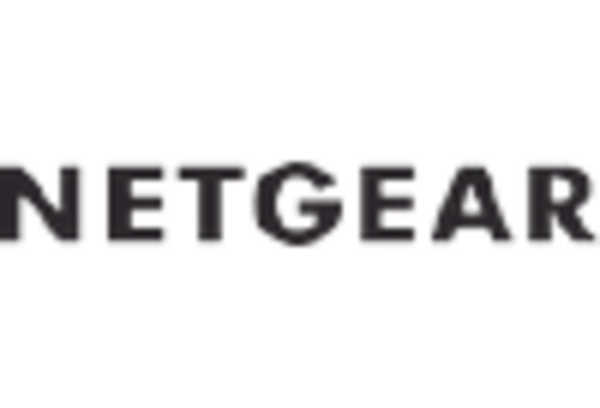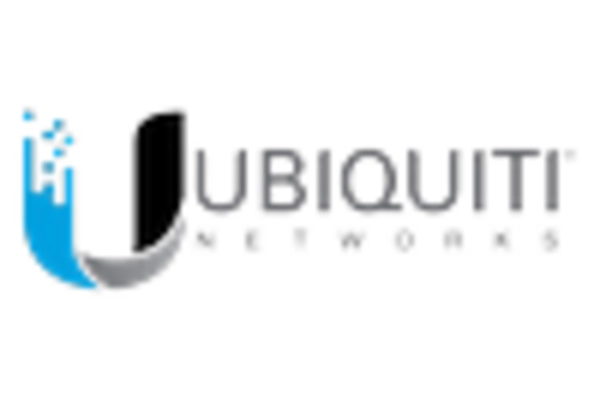Integration of IoT Devices
The rapid integration of Internet of Things (IoT) devices in South Korea is significantly influencing the wlan Market. With an estimated 30 million IoT devices expected to be in use by 2026, the demand for reliable and high-capacity wireless networks is surging. These devices, ranging from smart appliances to industrial sensors, require stable and fast connections to function effectively. As a result, businesses and consumers are increasingly investing in advanced wlan solutions to accommodate the growing number of connected devices. This trend is likely to drive innovation in wlan technologies, as manufacturers strive to develop products that can handle the increased data traffic and connectivity demands posed by IoT ecosystems. The wlan Market is thus positioned for substantial growth as it adapts to the needs of an increasingly interconnected world.
Rising Cybersecurity Concerns
As the reliance on wireless networks increases, so do concerns regarding cybersecurity in the wlan Market. In South Korea, where digital transformation is rapidly advancing, businesses and consumers are becoming more aware of the potential risks associated with unsecured wireless connections. Recent surveys indicate that over 70% of South Korean companies consider cybersecurity a top priority when investing in wlan solutions. This heightened awareness is driving demand for secure wlan technologies that offer robust encryption and protection against cyber threats. Consequently, manufacturers are focusing on developing advanced security features in their products, which is likely to enhance the overall value proposition of wlan solutions in the market. The emphasis on cybersecurity is expected to shape the future of the wlan Market, as stakeholders prioritize secure connectivity.
Expansion of Mobile and Remote Work
The shift towards mobile and remote work arrangements in South Korea is reshaping the wlan Market. As more companies adopt flexible work policies, the need for robust wireless networks has become paramount. Data indicates that around 60% of South Korean employees now work remotely at least part-time, necessitating reliable wlan solutions for seamless connectivity. This trend has prompted businesses to invest in upgrading their wireless infrastructure to support a distributed workforce. Consequently, the wlan Market is experiencing growth as organizations seek to enhance their network capabilities, ensuring employees can access critical resources from various locations. This shift not only drives demand for wlan products but also encourages innovation in wireless technologies to support the evolving work environment.
Increased Demand for High-Speed Internet
The growing demand for high-speed internet access in South Korea is a primary driver of the wlan Market. With the proliferation of digital services and online content, consumers and businesses alike are seeking faster and more reliable internet connections. According to recent data, approximately 95% of South Korean households have access to high-speed internet, which is significantly higher than the global average. This trend is likely to continue, as the government invests in expanding fiber-optic networks and enhancing wireless infrastructure. The wlan Market is expected to benefit from this increased demand, as consumers upgrade their devices and networks to accommodate higher speeds and improved connectivity. As a result, manufacturers and service providers are focusing on developing advanced wlan technologies to meet these evolving consumer needs.
Government Support for Technological Innovation
The South Korean government's commitment to fostering technological innovation is a crucial driver of the wlan Market. Through various initiatives and funding programs, the government aims to promote research and development in wireless technologies. Recent reports suggest that the government has allocated over $1 billion to support the advancement of 5G and wlan technologies, which is expected to stimulate growth in the sector. This support not only encourages local companies to innovate but also attracts foreign investment in the wlan Market. As a result, the landscape for wireless technology is evolving rapidly, with new products and solutions emerging to meet the demands of consumers and businesses. The government's proactive approach is likely to sustain momentum in the wlan Market, fostering a competitive environment that drives further advancements.
















